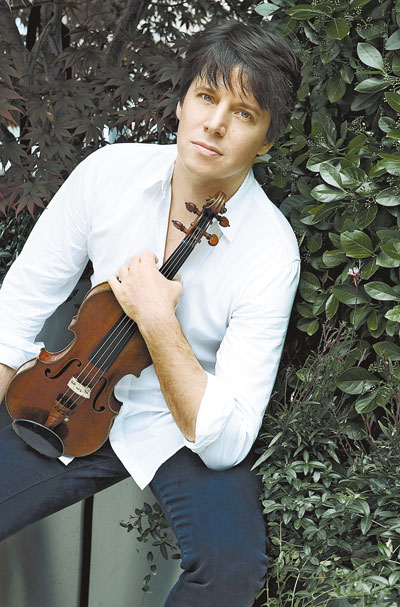 Debra Li debra_lidan@163.com WHILE basketball fans were lamenting the departure of a genius from the court, a violin genius — also Kobe’s compatriot — reassured fans that he would continue playing for as long as he can. On Thursday night, Joshua Bell, one of the most imaginative and technically gifted violinists of our time, gave a perfect and extraordinary performance for local fans at Shenzhen Concert Hall. Bell is in his late 40s now, but there’s still a sort of elfin quality to his playing. There’s the trademark untucked shirt, the dancing on the balls of the feet, the mop of flying hair. But in a program that ranged from Vitali to Ravel, it was clear that there’s also an almost effortless freshness in his playing: It sounds utterly spontaneous while underpinned with a flawless sense of drama and narrative line. Vitali’s “Chaconne in G Minor,” with which Bell opened the program, is a piece from his early career. “It used to be a very popular piece that has disappeared from the repertoire. Similar to some pieces by Wieniawski and Sarasate, it’s from a different era,” Bell told the Shenzhen Daily in an interview tucked into his tight schedule before Thursday’s show. “People don’t play much of these because they are not ‘authentic’ Baroque, but romanticized version of Baroque music, which is a shame. They are the show pieces my heroes Heifetz and Kreisler used to play, and I want to bring them back.” An “appetizer” for the audience, Bell’s technically impeccable performance is charged with emotions, the sweet and pure sound from his Stradivarius immediately grabbing the audience. The “main course” of the night, Beethoven’s “Violin Sonata No. 9 in A Major, Op. 47,” is technically hard in a sense because if you mess up the tiniest little thing, or the phrasing isn’t just exactly perfectly executed — you will ruin the whole piece. Bell delivered the piece with pinpoint accuracy. “For me, Beethoven is the greatest composer of all time, and I’m doing a lot of Beethoven lately, having six out of his nine symphonies with the St. Martin-in-the-Fields,” Bell said. “Nobody is more dramatic or interesting than Beethoven. The job of the player is to go inside Beethoven and show what an interesting world he has created.” To picky ears, though, the most perfect moments of the evening came in Ravel’s “Sonata in G Major for Violin and Piano.” Accompanied by the young but talented pianist Alessio Bax, Bell turned in a ravishing reading, a marvel of evanescent colors, shimmering light and the compelling, elusive beauty of a dream. “Beethoven is solid and structured; by contrast, Ravel is impressionistic,” Bell explained. “I love French music, such as the works of Faure and Debussy. Their music allows violin to do all kinds of interesting sounds, and I’d like to take advantage of the Stradivarius.” Bell also provided some luscious “desserts” not listed on the program: Brahms’ “Hungarian Dance No. 1,” Massenet’s “Meditation” and Sarasate’s “Gypsy Airs.” Nothing better than some old favorites to conclude the evening. | 
